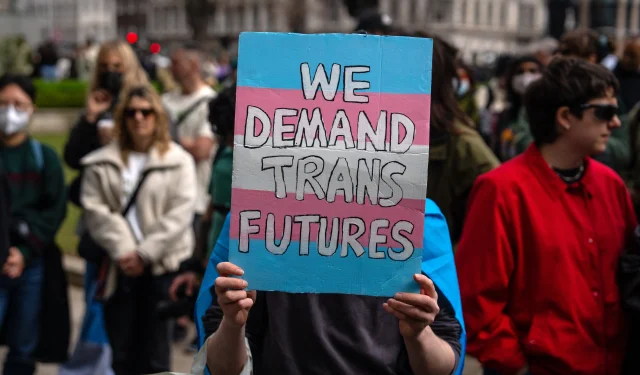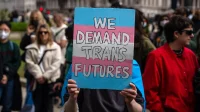Massive Protest Erupts in London Following U.K. Supreme Court Ruling on Gender
On April 16, 2025, a pivotal Supreme Court ruling in the United Kingdom defined the term “woman”exclusively for those assigned female at birth, thereby excluding transgender women from legal recognition. This unanimous decision has far-reaching implications, particularly affecting the 2018 Scottish law which mandated that boards of public entities include at least 50% women, a definition that previously encompassed transgender individuals.
Rallying Cry Against Transgender Discrimination
The ruling sparked immediate backlash, culminating in a significant protest at Parliament Square. On Saturday, April 19, thousands of activists and their supporters gathered to voice their grievances. The atmosphere was charged with chants aimed at prominent author J.K. Rowling, whose financial backing for the legal challenge from Campaigners for Women Scotland has been heavily criticized. Rowling’s response to the protests on X (formerly Twitter) was dismissive, expressing disappointment that only a thousand protesters showed up and cheekily referencing her financial disinterest in the fate of her books with the comment, “I get the same royalties whether you read them or burn them. Enjoy your marshmallows!”
Controversy Surrounds Upcoming Harry Potter Series
This protest coincided with Warner Bros. unveiling the adult cast for its highly anticipated television adaptation of the Harry Potter series. The show, which plans to cover one book per season, features Francesca Gardiner (known for her work on Succession) as the showrunner, and Mark Mylod (Game of Thrones) directing select episodes. However, the casting of John Lithgow as Professor Albus Dumbledore has drawn criticism due to his American nationality, contrasting with previous portrayals by British actors Richard Harris, Michael Gambon, and Jude Law.
Voices from the Cultural Sphere
Public figures are also weighing in on the ruling and its implications. Bridgerton star Nicola Coughlan has openly condemned both the court’s decision and its proponents, drawing parallels in her Instagram posts that referenced J.K. Rowling indirectly. Coughlan’s messages have since vanished, but they resonated with many who oppose the narrowing of gender definitions in legal contexts.
As these events unfold, they highlight a significant cultural and legal battle regarding the recognition of transgender rights in the U.K. and beyond, showcasing the complexity of social identities and the ongoing dialogue around equality.


